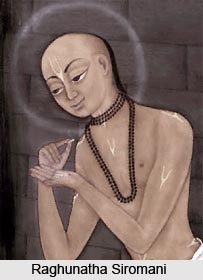Raghunatha Shiromani was born at Navadvipa in the 15th to 16th century and was a Sanskrit scholar and Nyaya philosopher born in the village of Panchkhanda in sylhet district which is in present day Nadia district of West Bengal. Sulapani, a noted writer of Smriti was his grandfather. Raghunatha was a student of Vasudeva Sarvabhauma. He also brought the new school of Nyaya known as Navya Nyaya. It represented the final development of Indian formal logic. He is believed to have been a classmate of Chaitanyadev. Navya Nyaya is divided into three ages:
 1) Pre-Shiromani, (2) Shiromani and (3) Post-Shiromani.
1) Pre-Shiromani, (2) Shiromani and (3) Post-Shiromani.
His analysis of relations revealed the true nature of number that is inseparable from the abstraction of natural phenomena. His studies of metaphysics dealt with the negation of a complex reality. One of his famous compositions was the Tattvacintamanididhiti. It was a commentary on the Tattvacintamani of Gangesa Upadhysya, the founder of the Navya Nyaya School. He is considered as one of the most original thinkers in Indian philosophy. Raghunath studied the shastras under Pundit basudev sarvabhauma. He got lessons on Navya Nyaya from Pundit Paksadhar Misra who was an eminent logician of Mithila. He established Navadvip as the principal centre for studying Navya Nyaya.
Raghunath has written around forty books that includes commentaries. His other works include Pratyaksamani-didhiti, Anumana-didhiti, Padartha-khandana, Dravyakiranavali, Prakashadidhiti, Gunakiranavali-didhiti, Atmatattva-viveka-didhiti, Nyaya-lilavati-prakasha-didhiti, Krtisadhyanumanadidhiti, and Vajapeyavada.
Raghunath premeditated the shastras under Pundit basudev sarvabhauma and got lessons on Navya Nyaya from Pundit Paksadhar Misra, an eminent logician of Mithila. After carrying out his studies, Raghunath started teaching Nyaya Sastra, and step by step becoming celebrated throughout India. It is assumed that he overpowered Paksadhar in a debate and established Navadvip as the principal centre for studying Navya Nyaya. Raghunath wrote forty books, including commentaries. His interpretation Tattva-chintamani-didhiti is very famous and considered essential for the study of Navya Nyaya. His other famous works include Pratyaksamani-didhiti, Anumana-didhiti, Padartha-khandana, Dravyakiranavali, Prakashadidhiti, Gunakiranavali-didhiti, Atmatattva-viveka-didhiti, Nyaya-lilavati-prakasha-didhiti, Krtisadhyanumanadidhiti, and Vajapeyavada. Raghunatha`s analysis of relations revealed the true nature of number, inseparable from the abstraction of natural phenomena, and his studies of metaphysics dealt with the negation or non-existence of a complex reality. His most famous work in logic was the Tattva-chintamani-didhiti, a commentary on the works of Gangesha, founder of the New Nyaya School.












